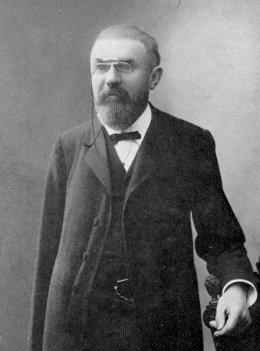Henri Poincaré
Created by Karina Clark
Henri Poincaré was a French mathemetician and physicist born on April 29, 1854.
Biography
Henri was born to father Léon Poincaré and mother Eugénie Launois. In 1862 Henri entered the Lycée in Nancy (now renamed the Lycée Henri Poincaré in his honour). He spent eleven years at the Lycée and during his time there he was one of the top students in everything he studied. Henri excelled in mathematics, Henri was described by his mathematics teacher as a "monster of mathematics" and he won first prizes in the concours général, a competition between the top pupils from all the Lycées across France. After graduating with his doctoral degree he then became a professor at the University of Paris. During this time, Poincare made significant contributions to the world of mathematics and science. Some of his most notable contributions include Algebraic topology, the theory of relativity, the recurrence theorem, the three-body problem, quantum mechanics and differential equations.
Contributions to Physics
While Henri's work was mainly focused on Mathematics he made many important contributions to physics as well.
Relativity: Lorentz ether theory and History of special relativity
Astronomy and Celestial Mechanics: Poincaré authored important works on astronomy for the equilibrium figures gravitating rotating fluid
Theories: algebraic topology, the theory of analytic functions of several complex variables, the theory of abelian functions, Poincaré recurrence theorem, number theory, the theory of diophantine equations, the theory of electromagnetism, and the special theory of relativity
Awards
Poincaré won many awards during his lifetime and even went on to have many named after him.
Oscar II, King of Sweden's mathematical competition, 1887
Foreign member of the Royal Netherlands Academy of Arts and Sciences, 1897
American Philosophical Society, 1899
Gold Medal of the Royal Astronomical Society of London, 1900
Bolyai Prize, 1905
Matteucci Medal, 1905
French Academy of Sciences, 1906
Académie française, 1909
Bruce Medal, 1911
Connectedness
- I find this topic very interesting because it is about a very influential person in both mathematics and physics.
- My major has a lot to do with both Physics and Mathematics, but the thing that I find most interesting and connected to my major is the way he contributed to two different types of learning and in order to be a Biomedical Engineer you have to be able to understand the mechanics of how the human body works along with the biology behind it. It mixes two different styles of science which is exactly what Poincare did.
See Also
The Three-Body System: [1]
Algebraic Topology: [2]
The Theory of Relativity: [3]
The Recurrence Theorem: [4]
Quantum Mechanics: [5]
Differential Equations: [6]
References
http://www.physicsland.com/poincare.html
https://en.wikipedia.org/wiki/Henri_Poincaré
http://www.encyclopedia.com/topic/Jules_Henri_Poincare.aspx
http://www-groups.dcs.st-and.ac.uk/~history/Biographies/Poincare.html
